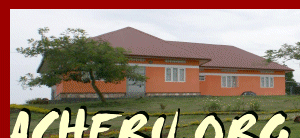|
|
| Circular -
September 2018, What happens in the Acheru office, and news of a former patient |
| Every month I put news on the website or in a circular about progress with the work of Acheru, and I want the emphasis to remain firmly on our work in Uganda, but sometimes I am asked about what happens here in Ireland, and what I do. Most of the work of Africare is undertaken by myself, Hazel, and Philip. That's not how it was planned. Some years ago, following open heart surgery, I did have thoughts of retirement or semi retirement but that didn't work out and, apart from some days fixing cars to supplement my pension, Africare is almost a full time job for me. Of course for 'Africare' read 'Acheru', which is our main responsibility apart from a limited involvement with medical equipment and an interest in some other countries. |
| I'm 70 now and sometimes feel like I've lived several lifetimes. Among other things I had many years of competing in car rallies, and of working on vintage and classic cars. For many years there was the very satisfying work of preparing and sending out medical equipment, doing things which I derived pleasure from, which I felt matched my skills and experience, and which I felt comfortable with. However, through all the years of my Africare responsibilities with Besaniya, Cherub, and now Acheru, I've felt myself constantly pushed beyond what I felt comfortable with, but it's my calling and I don't see that changing. That doesn't mean I'll stop trying to prepare for the future as I don't like the idea of Acheru being so dependent on me. My aim is to ensure continuance of Acheru whatever happens to me, rather than trying to find a way out. I've very generously been given free use of very nice offices and find this an ideal working environment - I'm afraid I was too easily distracted when I was trying to work from home. |
| The last few months have been disrupted by health issues among other things - at least that's my excuse if you've been waiting for a reply to a letter - but I hope soon to settle back into some sort of routine. I'm sitting in the middle between Acheru and the donors and that means I communicate a lot with the Acheru staff and board. Joyce, as Acheru administrator and secretary to the board, deals with most of this. We haven't always seen eye to eye and at times we argue, but we manage to maintain a good personal and working relationship which is so essential to all the work; we're both committed to seeing it succeed. |
| I was pleased to hear that all the paperwork was successfully completed and the twin cab pickup is now in use with Harriet and Rose. |
| I got a surprise a few weeks ago when I had an unexpected opportunity to meet a former Cherub patient. She was making a brief visit to Ireland at the invitation of people here who have helped sponsor her. The first picture shows Aidah 12 years ago, as we found her in the village where she spent her days sitting in the dirt with no prospects for the future. |

|
| Aidah in 2006 |
| Following amputation she was brought to N. Ireland by her sponsors and provided with artificial limbs. Our Ugandan partners have a lot of experience with prosthetics and as Aidah grew they made replacements for her, but found it difficult to comfortably attach them on a double amputee. This led to the involvement of Musgrave Park hospital, with one of their technicians volunteering to go to Uganda to give instruction on prosthetics and their attachment. The second picture was taken in Carrickfergus when we went out for coffee. I see many 'before' and 'after' pictures and marvel at the change, wondering what would have happened without our intervention. |

|
| Aidah in August 2018 |
| Following her rehabilitation at Cherub Aidah did very well at school, winning a scholarship to study medicine, and is now starting her third year at Makerere University. She has also travelled the world as an ambassador for paralympic sport. She has shown great determination, suffering many discouragements and setbacks during her first year of study, and it was a delight to meet with her, to find her so articulate and confident, and to see how far she has come. But Aidah, and all the other children we've treated, are part of our history, they're not the ones we need to worry about now. We need to look ahead, to all the children we still haven't found. I am acutely aware of all sorts of problems at home and abroad, from local politics to the persecution of Christians in so many countries, and I have to make an effort to maintain my focus on our own work, the sad reality being that there remain many others for whom Acheru may be their only hope. |
| Brian Dorman |
|
|
|



